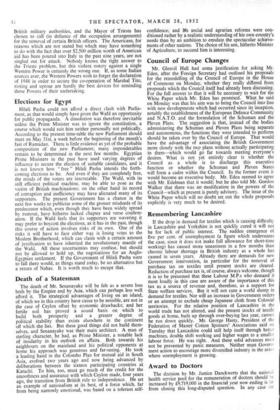Elections for Egypt
Hilali Pasha could not afford a direct clash with Parlia- ment, as that would simply have given the Wafd an opportunity for public propaganda. A dissolution was therefore inevitable unless the Prime Minister was to ignore the constitution, a course which would suit him neither personally not politically. According to the present time-table the new Parliament should meet on May 31st, a week before the beginning of the month's fast of Ramadan. There is little evidence as yet of the probable composition of the new Parliament; many imponderables remain to be determined in the next few months. Egyptian Prime Ministers in the past have used varying degrees of influence to secure the election of suitable candidates, and it is not known how " free " Hilali Pasha intends the forth- coming elections to be. And even if they are completely free, the minds of the voters are inscrutable. The Wafd, with its still efficient political machine, may be able to pose as the victim of British machinations; on the other hand its record of corruption and inefficiency may have alienated many of its supporters. The present Government has a chance in the next few weeks to publicise some of the grosser misdeeds of its predecessor which, even though they have been widely spread by rumour, have hitherto lacked chapter and verse confirm- ation. If the Wafd feels that its supporters are wavering it may prefer to boycott the elections, as it has in the past, though this course of action involves risks of its own. One of the risks it will have to face either way is losing votes to the Moslem Brotherhood, which can claim with a certain amount of justification to have inherited the revolutionary mantle of the Wafd. All these uncertainties may confuse, but should not be allowed to hold up, the negotiations for an Anglo- Egyptian settlement. If the Government of Hilali Pasha were to fall there would, as things stand today, be no alternative but a return of Nahas. It is worth much to escape that.


































 Previous page
Previous page